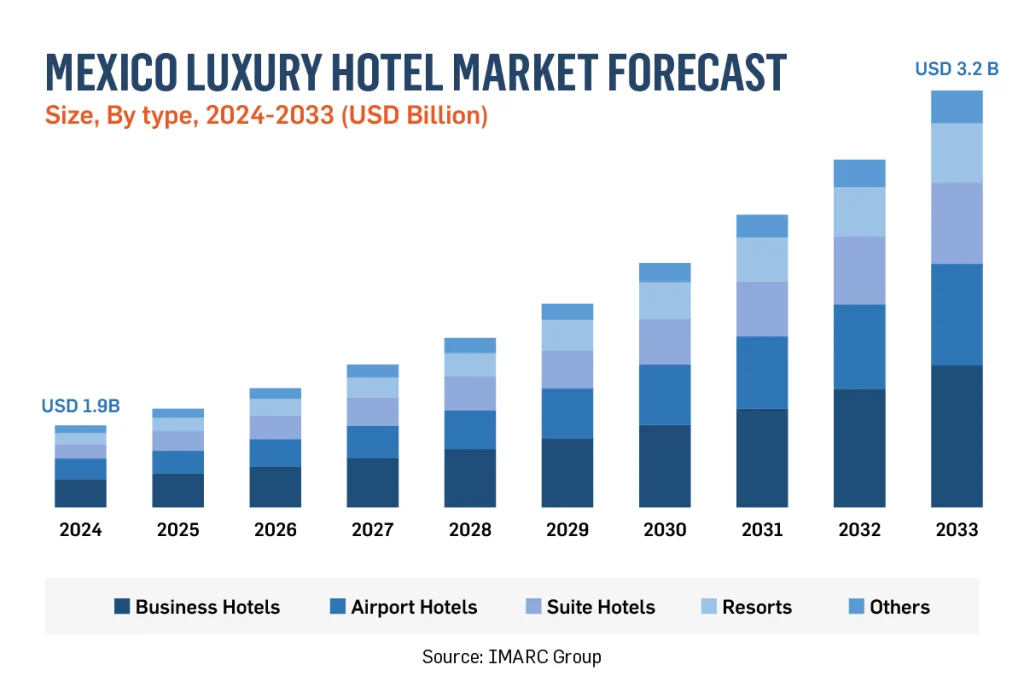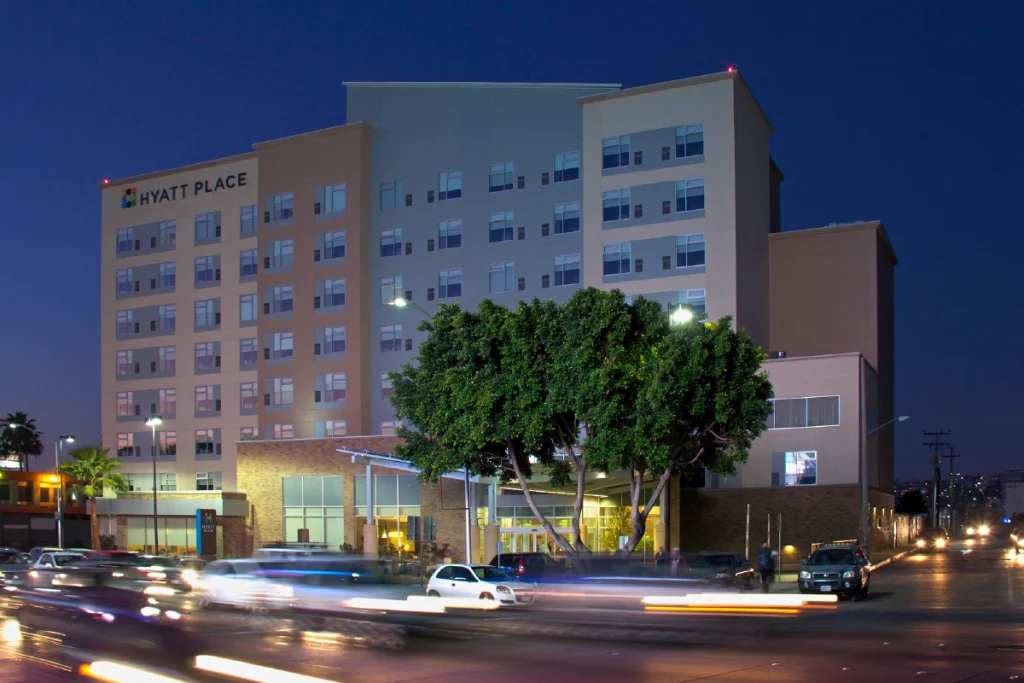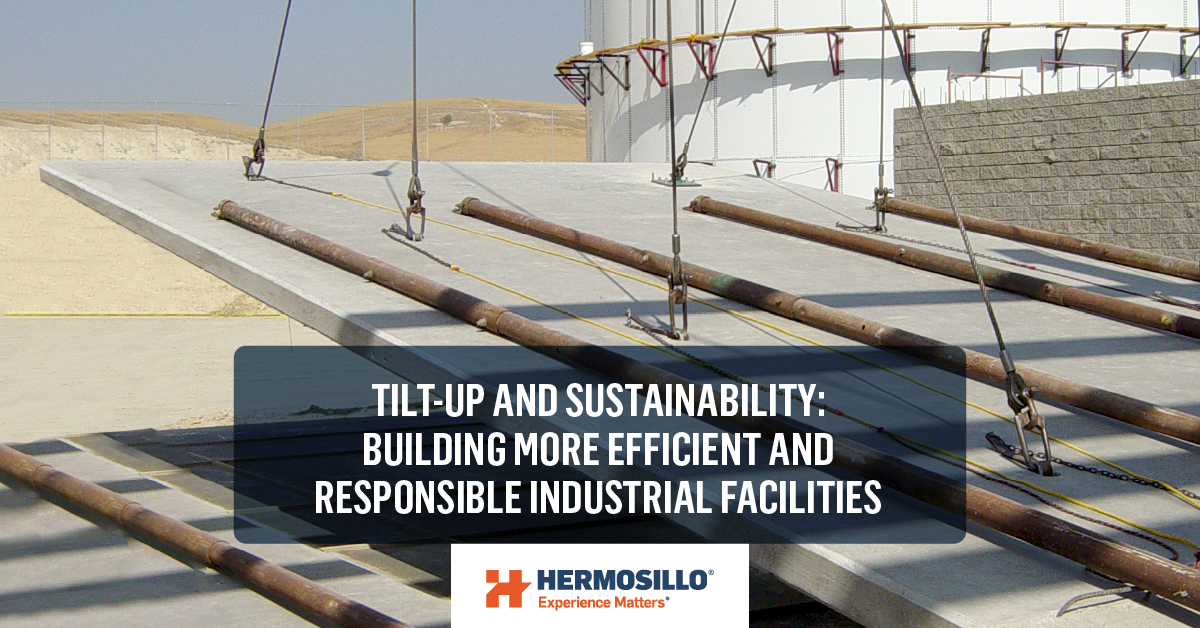
With its rich cultural heritage, breathtaking landscapes, and world-renowned hospitality, Mexico is a must-visit destination for luxury tourism. This leadership is reflected in investor confidence: in 2024, over 50% of investors increased their contributions to high-end hotels, underscoring the importance of developing unique and transformative hospitality experiences.
The hospitality industry in Mexico is experiencing unprecedented growth. According to the IMARC Group, the Mexican luxury hotel market was valued at USD 1.9 billion in 2024 and is expected to reach USD 3.2 billion by 2033, growing at a compound annual growth rate (CAGR) of 5.5%.
Globally, the luxury hotel market was valued at USD 107.77 billion in 2024 and is projected to reach USD 157.59 billion by 2029, according to Mordor Intelligence.

México: Leading hotel construction in Latin America
From a construction standpoint, Mexico is leading Latin America with a record 248 hotel projects in progress, totaling more than 38,000 rooms. By mid-2025, the number of active projects had risen to 263, with over 40,400 rooms, representing a 10% increase in project count and a 7% increase in room volume compared to the previous year, according to the Latin America Construction Pipeline Trend Report by Lodging Econometrics.
This expansion aligns with rising occupancy rates: Los Cabos achieved a 72% occupancy rate in 2024, while the national average remained close to 70%. Other highly attractive destinations include Tulum, Cancun, Punta Mita, Puerto Vallarta, Riviera Maya and all Yucatán Peninsula, favored for their pristine beaches, culinary offerings, and immersive cultural experiences.
Los Cabos, in particular, has seen a surge in luxury developments with the arrival of Four Seasons, Hilton, Park Hyatt, and Grand Velas, reinforcing Mexico’s global reputation as a hub for upscale tourism.
Key Trends in Luxury Hotel Design and Construction
1. Experiential and Wellness-Oriented Design
Today’s travelers demand more than accommodation—they seek transformative experiences. Wellness tourism has become a defining pillar of luxury hospitality, and Mexico has responded effectively.
The Mexican government reports that wellness tourism in Mexico has grown at an annual rate of 13%, ranking the country seventh globally among destinations for wellness travel. World-class spas, meditation retreats, and holistic therapies are increasingly being integrated into the offerings of luxury hotels. According to the Global Wellness Institute, the wellness tourism market is projected to reach USD 1.1 trillion by 2025, growing at a rate exceeding 10% annually since 2019.
For luxury hotels developers, this means designing facilities that promote physical and emotional well-being: high-end fitness centers, wellness cuisine, and advanced technologies such as infrared saunas, hyperbaric chambers, and IV therapies. The focus is on creating environments where guests leave feeling better than they did when they arrived.
2. Sustainability
Sustainability has moved from being an optional feature to a core expectation in luxury hospitality. Leading hotels in Mexico are adopting eco-conscious practices, like:
- Using recycled and locally sourced materials.
- Incorporating renewable energy systems.
- Supporting community-based programs.
- Integrating vertical gardens, terraces with native vegetation, and outdoor spaces that enhance the guest’s connection to nature.
Innovations such as modular hotels with self-sufficient energy systems and predictive systems that minimize energy waste not only reduce environmental impact but also attract eco-conscious travelers.
3. Technological Innovation
The luxury hotel industry is increasingly relying on innovative solutions and advanced methodologies to enhance both operations and the guest experience.
- BIM and Lean Construction are now essential tools to optimize cost, time, and quality in hotel design and construction.
- Automation and self-service are becoming standard: mobile apps allow guests to control room temperature, lighting, and entertainment.
- Augmented Reality and Virtual Reality tools enable travelers to preview facilities before arrival, enhancing anticipation and satisfaction.
- AI-powered assistants are emerging, allowing guests to make reservations or control in-room settings by voice command.
- Building Management System (BMS) is a technological platform that controls and optimizes HVAC, lighting, and security systems. This system ensures that equipment (especially air conditioning and electrical systems) performs according to the expected efficiency. Additionally, it allows them to be turned on or off, adjusted in intensity, or modified according to real-time needs. For example, if people are present, the equipment activates; if not, it shuts down or reduces activity, ensuring both comfort and energy efficiency.
Notably, 75% of Millennial and Gen Z travelers say they are more likely to stay at hotels that offer self-service technology, making digital innovation an imperative for new projects.
4. Cultural Immersion
For modern travelers, true luxury lies in authenticity. Mexico has successfully woven its cultural richness into the luxury residences’ tourist experience, from exclusive dining prepared by local cuisine to curated tours of historic landmarks. Luxury hotels are also collaborating with Mexican artists and designers to create unique spaces that reflect the country’s heritage while maintaining world-class comfort. This way, tourists will have a real cultural immersion.
5. Spaces for Interaction and Community
While exclusivity and privacy remain central to luxury hospitality, guests increasingly value well-designed communal spaces such as panoramic terraces, social lounges, and multifunctional lobbies. These areas provide a balance between relaxation and meaningful connections, aligning with the social needs of today’s travelers.
Factors Driving Mexico’s Hospitality Growth
The rapid development of Mexico’s hospitality sector is fueled by:
- Rich cultural heritage and diverse attractions that attract millions of visitors.
- Foreign direct investment in luxury hotels, resorts, and entertainment infrastructure.
- Improved connectivity thanks to low-cost airlines and upgraded transport networks.
- Government initiatives promoting tourism.
- Rising disposable income of the middle class, boosting leisure spending.
- Business tourism driven by conventions, events, and international expos.
- Sustainable travel demand, encouraging eco-tourism and green hospitality solutions.
Economic stability, workforce training, infrastructure development, and global travel trends all play critical roles in shaping this dynamic market.
Hermosillo’s Experience in Hospitality Design and Construction
Hermosillo’s hospitality journey began in 1969 with the Motel Valle Grande in Sonora. Since then, we have completed 33 hotels across Mexico. With more than 60 years of experience, we stand out as one of the few contractors capable of supporting clients from concept to completion.
Turnkey Solutions with Creative and Technical Excellence
- Comprehensive services: concept, design, construction, and delivery.
- Collaborative, brand-compliant solutions.
- A focus on comfort and convenience to enhance guest satisfaction.
Technology that Makes a Difference
We integrate BIM and Lean Construction to achieve Target Value Design, anticipate challenges, and streamline collaboration. Our expertise in LEED® certification and net-zero projects ensures every development meets the highest standards in sustainability and efficiency.
We have also partnered with global hospitality leaders. For example, our work with Hyatt Place Hotels in Los Cabos, Celaya, and Tijuana demonstrates our ability to deliver world-class projects that align with international standards. (Read the full Hyatt Place Case Study here.)

Why Choose Hermosillo for Your Hospitality Project?
- Proven Expertise: 33 projects, including landmark hotels and resorts.
- Cutting-Edge Methodologies: BIM, Lean Construction, sustainability.
- Dedicated Teams: Experts who collaborate seamlessly with clients and adapt to each brand’s vision.
- A Trusted Partner: From the first draft to ribbon-cutting, we ensure vision, execution, and excellence.
Conclusion
The hospitality industry in Mexico is not only growing—it is reshaping how travelers experience destinations. With sustainability, innovation, wellness, and cultural authenticity driving demand, the opportunities for developing high-quality hospitality projects are greater than ever.
At Hermosillo, we are ready to be your partner in building the next iconic hotel or resort. Combining six decades of expertise with cutting-edge technology and a commitment to excellence, we ensure your investment becomes a destination in itself.
Are you ready to bring your vision to life as a world-class hospitality project? Contact us to discuss how we can make it happen.






